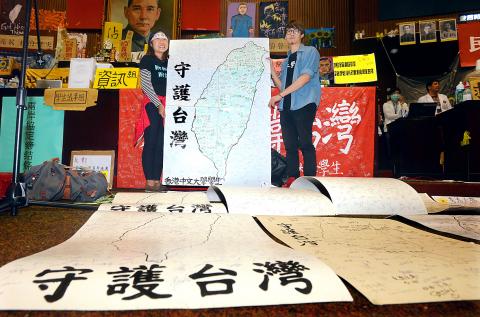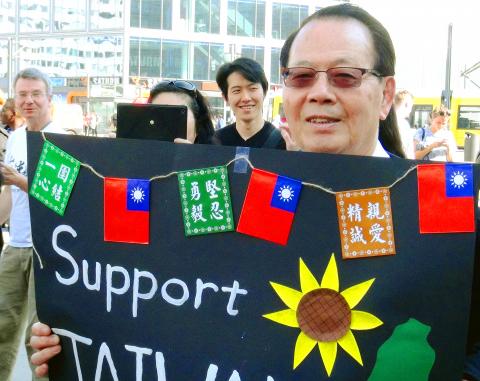Taiwanese students and expatriates in 49 cities across 21 countries organized rallies timed to coincide with Sunday’s demonstration in Taipei, as part of a global networking campaign to support the “Sunflower student movement.”
Calling it “24-Hour Relay Across the Globe in Support of Taiwan,” the worldwide rallies saw Taiwanese and other participants shouting the same slogans as their counterparts in Taipei: “Protecting Taiwan’s Democracy,” and “Withdraw the Trade Deal,” which gained press coverage and wide circulation among online social media.
Some students held up placards that read: “Taiwan is not for sale,” “Transparency, Democracy and National Security for Taiwan” in support of the movement which started with protesters occupying the legislature in Taipei on March 18.

Photo: Lin Cheng-kung, Taipei Times
The worldwide networking rally began in Australia and New Zealand on Sunday morning, with events in Auckland, Sydney, Melbourne, Brisbane, Canberra, Adelaide and other locations.
The international relay proceeded through the Japanese cities of Tokyo, Kyoto and Fukuoka, South Korea’s Seoul and Busan, Hong Kong, the Philippines and other Asian countries.
Hong Kong organizers said the protesters received an enthusiastic response, with more than 1,000 people joining the rally.

Photo: CNA
After some speeches, they marched from Causeway Bay to the Charter Garden next to the Legislative Council building.
As the day progressed, Taiwanese in Europe joined the global effort, with notable rallies in Berlin, Frankfurt, Vienna, Zurich, Paris, London, Edinburgh, Madrid and Stockholm.
The relay culminated in North America, with US events taking place in New York, Boston, San Francisco, Los Angeles, Seattle and other cities, as well as Montreal, Toronto and Vancouver in Canada.
More than 100 Taiwanese students and Taiwanese-Americans gathered in front of Washington’s Taipei Economic and Cultural Representative Office.
Despite the freezing rain and subzero temperatures, they performed street theater skits, handed out sunflowers to passersby and delivered a petition to the office.
Washington organizer Chao Tse-hua (趙澤華) said he is a student at Pennsylvania State University.
“We drove four hours from Pennsylvania to DC. We just want those students in Taiwan fighting for democracy to know that people abroad support their cause,” Chao said.
In New York City’s Times Square, about 400 people joined a mass sing-along and conveyed their messages in slogans, while holding sunflowers.
In the UK, more than 300 students and overseas Taiwanese headed to Trafalgar Square in London. They presented musical entertainment to the audience and vocalized their support of the Sunflower movement.
The event in Berlin took place at Alexanderplatz, a public square and transport hub, and was organized by Taiwanese university students.
Calling themselves the “3.30 Berlin Action Group,” organizers said more than 300 people joined in their rally, with a series of public discussions and lectures on the cross-strait agreement, the pros and cons of free trade, Taiwan’s human rights situation and its democratic governance system.
The largest event in Japan was held at Tokyo’s Yoyogi Park, where more than 700 people joined a rally.
Taiwanese students and expatriates in Tokyo were joined by their Japanese friends to call for the withdrawal of the cross-strait pact, shouting slogans in support of the Sunflower movement.
Additional reporting by Tsao Yu-fen, Hu Hui-ning and Chang Mao-shen

Alain Robert, known as the "French Spider-Man," praised Alex Honnold as exceptionally well-prepared after the US climber completed a free solo ascent of Taipei 101 yesterday. Robert said Honnold's ascent of the 508m-tall skyscraper in just more than one-and-a-half hours without using safety ropes or equipment was a remarkable achievement. "This is my life," he said in an interview conducted in French, adding that he liked the feeling of being "on the edge of danger." The 63-year-old Frenchman climbed Taipei 101 using ropes in December 2004, taking about four hours to reach the top. On a one-to-10 scale of difficulty, Robert said Taipei 101

A preclearance service to facilitate entry for people traveling to select airports in Japan would be available from Thursday next week to Feb. 25 at Taiwan Taoyuan International Airport, Taoyuan International Airport Corp (TIAC) said on Tuesday. The service was first made available to Taiwanese travelers throughout the winter vacation of 2024 and during the Lunar New Year holiday. In addition to flights to the Japanese cities of Hakodate, Asahikawa, Akita, Sendai, Niigata, Okayama, Takamatsu, Kumamoto and Kagoshima, the service would be available to travelers to Kobe and Oita. The service can be accessed by passengers of 15 flight routes operated by

Taiwanese and US defense groups are collaborating to introduce deployable, semi-autonomous manufacturing systems for drones and components in a boost to the nation’s supply chain resilience. Taiwan’s G-Tech Optroelectronics Corp subsidiary GTOC and the US’ Aerkomm Inc on Friday announced an agreement with fellow US-based Firestorm Lab to adopt the latter’s xCell, a technology featuring 3D printers fitted in 6.1m container units. The systems enable aerial platforms and parts to be produced in high volumes from dispersed nodes capable of rapid redeployment, to minimize the risk of enemy strikes and to meet field requirements, they said. Firestorm chief technology officer Ian Muceus said

MORE FALL: An investigation into one of Xi’s key cronies, part of a broader ‘anti-corruption’ drive, indicates that he might have a deep distrust in the military, an expert said China’s latest military purge underscores systemic risks in its shift from collective leadership to sole rule under Chinese President Xi Jinping (習近平), and could disrupt its chain of command and military capabilities, a national security official said yesterday. If decisionmaking within the Chinese Communist Party has become “irrational” under one-man rule, the Taiwan Strait and the regional situation must be approached with extreme caution, given unforeseen risks, they added. The anonymous official made the remarks as China’s Central Military Commission Vice Chairman Zhang Youxia (張又俠) and Joint Staff Department Chief of Staff Liu Zhenli (劉振立) were reportedly being investigated for suspected “serious